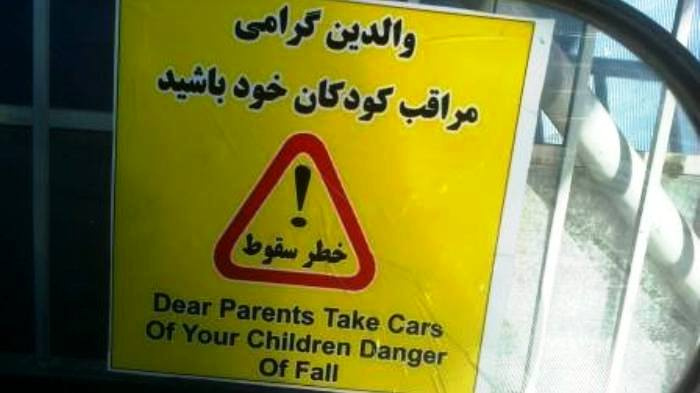Agent of Hegemony, Language of Science: Learning English raises controversy in Iran

(Sign in broken English asks parents to watch their children on the escalator. Source: Asr-e Iran)
Last Monday, Iran's Supreme Leader addressed a group of teachers on the occasion of the National Teachers' day. "The hegemonic system wants the future generation of other countries to have the same thoughts, culture, viewpoint and taste as itself in global affairs," Ayatollah Khamenei said. "Western intellectuals have said time and again that instead of 19th century-style conquests, the most effective and inexpensive way is to inject thoughts and culture into the younger generation of other countries, and to raise an elite class who serve as infantry of the hegemonic system," he added.
Against this scheme, Iran's Supreme Leader called for promotion of the domestic culture and language in Iran. "Unfortunately, in some occasions instead of promoting the Persian language, English is promoted, so much so that English is taught even in kindergartens," he said. "This doesn't mean I am against learning of a foreign language," Ayatollah Khamenei added. "But we should know [how] our enemy … has detailed plans to influence the next generation of the country." Criticizing the monopoly of English in Iran's educational system, Iran's Supreme Leader also referred to Spanish, French, and German as scientific languages that could be learnt at school.
Two days later, speaking to teachers in commemoration of the National Teachers' Day, Iran's president Hassan Rouhani also commented on the subject of teaching foreign languages at schools. Rouhani's remarks were by and large in line with Ayatollah Khamenei's remarks. "Why only one language?" he said. "We should make our younger generation familiar with several languages." However, the media underlined highlighted another segment of his speech, one which easily appeared as a direct encounter against the Supreme Leader.
"If in a school, 98 percent of students choose one [foreign] language and 2 percent chose another, we can't hire a teacher for the 2 percent," Rouhani had said in the same speech. "See how the Indian Subcontinent has made achievements in the IT industry relying on a massive population that relatively masters the English language," he added. "We should teach a language which makes acquisition of science easier, creates more jobs for the younger generation and facilitates our economic ties with the world."
The Principlist media were quick to lash out at Rouhani. Yaser Jebraeili, deputy in hardliner Fars News Agency minced no word in attacking the president, calling him "shameless" for confronting the Supreme Leader. "It is not the English language that is important for Rouhani," he said. "His actions are based on insolence and he believes he can establish a footing for himself this way. The only way to stop such discourtesy is that senior figures of the country … give him stern, open warning."
Later, the vocal Ahmad Alamolhoda, influential cleric and Friday prayers' leader of Mashhad, also attacked Rouhani for his remarks. "How unfortunate it is that … a person who claims to be a political leader, utters words against the Supreme Leader's remarks," he said, implicitly referring to Rouhani. Alamolhoda added a peculiar analytical dimension to his remarks, touching on the universial status of the English language: "English is not the language of science," he said, in direct response to Rouhani's words. "It's the language of ignorance and deception … no scientific community acknowledges English translations as scientific reference."
Fouad Izadi, Louisiana State University graduate and one of the few Principlist analysts fluent in English also jumped on the wagon. "India has made significant progress during the recent years, but that is not because of the English language, but for their empowerment in various field, including the military field," he said. Izadi added that promotion of English language is a main vector of creating "cultural hegemony". Tehran University lecturer also scoffed at Rouhani, claiming that he "cannot speak two sentences in English."
Despite promises made by officials of the Ministry of Education following Ayatollah Khamenei's remarks, it is highly unlikely that the situation changes in short-term and languages other than English be taught in Iranian schools (Arabic is taught already as Islamic lingua franca.) English is the most popular foreign language in Iran, mostly learnt at private language centers rather than through the notoriously inefficient methods of schools, and the post-JCPOA opening will only add to the desire among Iranians to master the language. The debate over English and its hegemonic dimension has already died down, as Principlists viewed it only as another opportunity to attack Hassan Rouhani.
IRD/66

